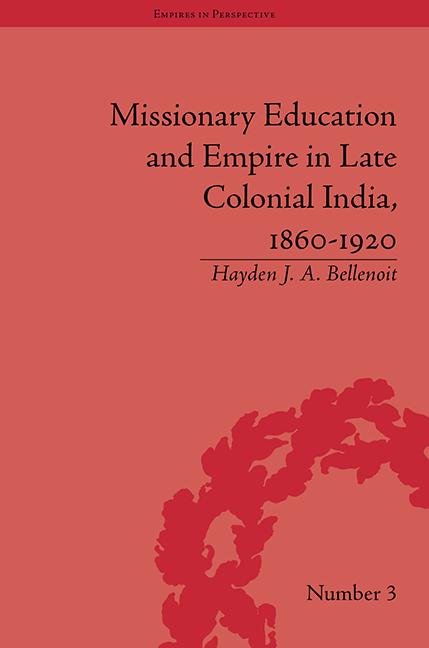Book contents
- Frontmatter
- CONTENTS
- List of Tables
- Acknowledgments
- Glossary
- List of Abbreviations
- Introduction
- 1 Knowledge, Religion and Education in Early Modern India
- 2 British Fears and Indian Society in the Emergence of North Indian Education, c. 1860–1920
- 3 Between East and West: Orientalism, Representations of and Engagements with India
- 4 The Failures of Education and its Sociological Bearings
- 5 Religious Interaction, the Curriculum and Indian Contestations of Late Colonial Knowledge
- 6 Maintaining Missionary Influence: Nationalism, Politics and the Raj c. 1870–1920
- Conclusion
- Notes
- Works Cited
- Index
1 - Knowledge, Religion and Education in Early Modern India
- Frontmatter
- CONTENTS
- List of Tables
- Acknowledgments
- Glossary
- List of Abbreviations
- Introduction
- 1 Knowledge, Religion and Education in Early Modern India
- 2 British Fears and Indian Society in the Emergence of North Indian Education, c. 1860–1920
- 3 Between East and West: Orientalism, Representations of and Engagements with India
- 4 The Failures of Education and its Sociological Bearings
- 5 Religious Interaction, the Curriculum and Indian Contestations of Late Colonial Knowledge
- 6 Maintaining Missionary Influence: Nationalism, Politics and the Raj c. 1870–1920
- Conclusion
- Notes
- Works Cited
- Index
Summary
One of the underlying arguments central to much recent scholarship on South Asia, empire, and missionaries in particular, is that the creation of an ‘other’, whether via the templates of gender, race or religion, was somehow unique to and a handmaid of colonialism. Whilst admitting that the creation of difference was indeed a part of the wider missionary experience within the empire, it was never absolute. This chapter takes a more nuanced understanding of both its uniqueness to colonialism and its overall significance. Its main aim is to put missionary engagements with India and Hinduism in a much wider context. Specifically, it argues that missionary disparaging of Hinduism and India were part of a much wider and longer tradition which existed both before the coming of the British and the crystallization of hardened racialist attitudes in the latter nineteenth century. Missionaries differed rather in degree and not in essence from their predecessors, and were utilizing the means and approaches of Arab, Persian and Indo-Muslim scholars before them. Anglican missionaries, though initially confrontational and disparaging of Hindu tradition, ‘Brahmanical tyranny’, and ‘repulsive and odious’ Indian social customs, had by the 1870s begun to settle down and more constructively engage with Indian religious traditions and knowledge systems. This was partly due to the moulding influence Indian society had exerted upon visiting holy men and religious scholars in the pre-colonial period. Yet at the same time, this was also informed by larger ideological and social shifts after the period of the Indian Mutiny. This chapter argues that the context of engagement with Hinduism after the mid-nineteenth century was not purely introduced by missionaries, but was reflective of debates which, in varying forms, had been taking place prior to the establishment of formal British dominion over the subcontinent. By giving the missionary experience a much wider chronology, this chapter aims to set the context for the remaining analysis in this book, which addresses the interactions between Indian tradition and Europeans.
- Type
- Chapter
- Information
- Publisher: Pickering & ChattoFirst published in: 2014



